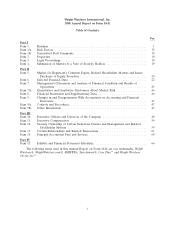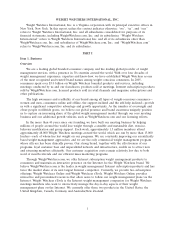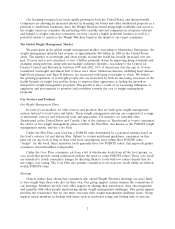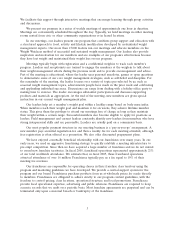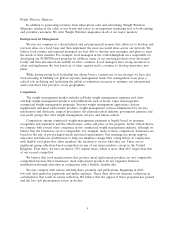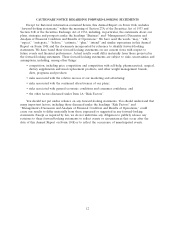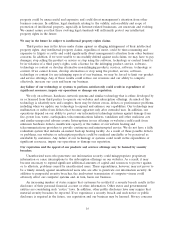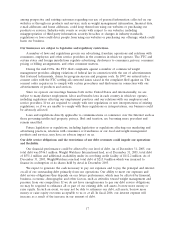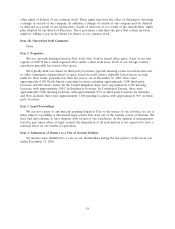WeightWatchers 2005 Annual Report Download - page 19
Download and view the complete annual report
Please find page 19 of the 2005 WeightWatchers annual report below. You can navigate through the pages in the report by either clicking on the pages listed below, or by using the keyword search tool below to find specific information within the annual report.Weight Watchers Magazine
In addition to generating revenues from subscription sales and advertising, Weight Watchers
Magazine reinforces the value of our brand and serves as an important marketing tool to both existing
and potential customers. We offer Weight Watchers magazines in all of our major markets.
Entrepreneurial Management
We run our company in a decentralized and entrepreneurial manner that allows us to develop and
test new ideas on a local basis and then implement the most successful ideas across our network. We
believe local country and regional managers are best able to develop new strategies and plans to meet
the needs of their markets. For example, local managers in the United Kingdom were responsible for
developing our POINTS-based program. In addition, many of our meeting products were developed
locally and then introduced successfully in other countries. Local managers have strong incentives to
adopt and implement the best practices of other regions and to continue to develop innovative new
plans.
While having strong local leadership has always been a cornerstone of our strategy, we have also
been investing in building our global corporate management team. Our management team plays a
critical role in driving and facilitating the global coordination necessary to optimize our international
assets and share best practices across geographies.
Competition
The weight management market includes self-help weight management regimens and other
self-help weight management products and publications such as books, tapes and magazines;
commercial weight management programs; Internet weight management approaches; dietary
supplements and meal replacement products; weight management services administered by doctors,
nutritionists and dieticians; surgical procedures; the pharmaceutical industry; government agencies and
non-profit groups that offer weight management services; and fitness centers.
Competition among commercial weight management programs is largely based on program
recognition and reputation and the effectiveness, safety and price of the program. In the United States,
we compete with several other companies in the commercial weight management industry, although we
believe that the businesses are not comparable. For example, many of these competitors’ businesses are
based on the sale of pre-packaged meals and meal replacements. Our meetings use group support,
education and behavior modification to help our members change their eating habits, in conjunction
with flexible food plans that allow members the freedom to choose what they eat. There are no
significant group education-based competitors in any of our major markets, except in the United
Kingdom. Even there, we have an almost 50% market share, which is more than 60% larger than that
of our nearest competitor.
We believe that food manufacturers that produce meal replacement products are not comparable
competition because these businesses’ meal replacement products do not engender behavior
modification through education in conjunction with a flexible, healthy diet.
We also compete with various self-help diets, products and publications. Beginning in 2003,
low-carb diets gained in popularity and media exposure. These diets advocate dramatic reductions in
carbohydrates that result in calorie reduction. We believe that the appeal of these programs has peaked
and the low carb phenomenon is now in decline.
9


